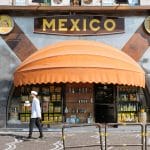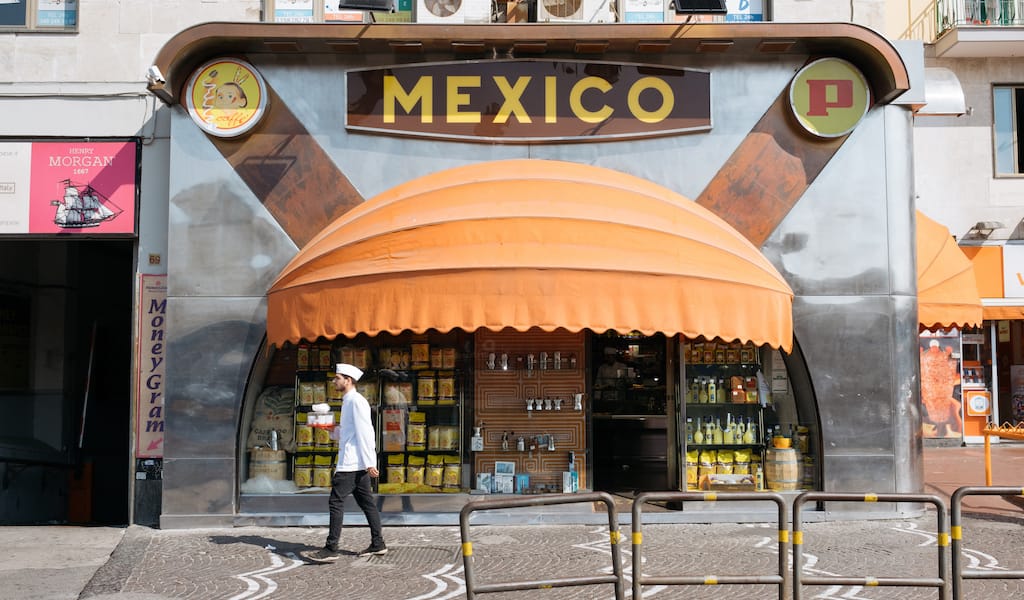Though ceramic dishes or tinned sardines are the standard take-home souvenirs for visitors to Lisbon, a less traditional – but still unique – gift from the city is the source of the warming aroma that permeates its cafés morning, noon and night.
A strong bica (espresso) is an integral part of Lisbon’s smellscape, and the few chimneystacks in sight over peripheral skylines reveal that there are still local businesses providing beans to restaurants and traditional stores here. Consuming this product, which has a long history, is deeply embedded in the city’s day-to-day, but cultural shifts (today it is quaffed more at the bar rather than at home), means many of the old coffee shops are now obsolete. Just a few, very specialized ones remain, but the ones that do still offer old-fashioned service, unique blends and perfect packaging, which make for great gift-giving for the holidays.

One of the last coffee houses in Lisbon is A Carioca. Located in Rua da Misericórdia, the eastern border of Bairro Alto, this little shop is an art deco gem, with a singular entrance of black marble and a red neon sign above the door. Its interior wooden shelving exhibits more than 150 types of teas (including Gorreana green tea from the Azores, the only tea plantation in Europe) and charmingly wrapped chocolates. But the main draw can be found in the glass boxes, which contain around 16 different kinds of coffee beans that can be mixed according to taste.
Here, the best blend can be created from Arabica and Robusta, different species of beans coming from two varieties of plants. Arabica, originally from Ethiopia and probably the first coffee plant to be cultivated, usually has a reduced quantity of caffeine, an enticing fragrance, full flavor and faded color. Robusta, with its origins in central and western sub-Saharan Africa, nowadays cultivated more in Brazil, gives a full-bodied coffee, sour, with a lingering aftertaste.
To achieve the best-suited mix, A Carioca’s passionate duo, Moreira and Jorge, kindly help customers find their favourite flavors – as employees have been doing here since 1936. This way, it is possible to make the coffee addict’s dream of having the correctly balanced cup for each hour of the day come true. Those who need to wake up suddenly should go for the Robusta Camões variety, equivalent to a morning bomb; for those who like a cup at the end of the day, the amount of Robusta can be reduced in the blend. For a quiet sleep, the best night blend would be composed of a higher quantity of Arabica, made predominantly of Colombian beans, for example – more aromatic and with less caffeine.
Body, aroma, color, smell and even price are valid criteria for the picky coffee-drinker here. The most expensive bean is São Tomé (around $20/kg), which grows in São Tomé and Principe’s mountains. Extremely aromatic, it can almost be described as the tea of coffees. Nicaragua Magarogype, with its giant beans, or Costa de Marfil (from Ivory Coast), with its well-balanced and full-bodied flavor, are just a few other examples of the varieties that can be found at A Carioca.

The name of this tiny store refers to the Brazilian term for anything or anyone originating from Rio de Janeiro and reconnects us to the colonial past of this product – which experienced a complex (and bitter) history of global trade, domination and slave displacement from Africa while Portugal ruled over its huge former colony. Despite its name, A Carioca’s beans were predominantly from the African continent.
“When the shop opened, there were many Portuguese people owning coffee plantations in Angola who were sending their product to Lisbon,” says Jorge. “Nowadays it comes from other places, given that the coffee production structures there have been destroyed.” The 27-year-long civil war after independence damaged most Angolan infrastructure, reducing the fourth-largest coffee exporter to just the dregs.
“Actually as things stand today, we usually buy the beans at the coffee exchange because the price oscillates quite a lot; when there is a good deal we buy about 300 bags of green coffee. Then we roast them at the factory in Anjos [a diverse neighborhood just north of downtown].”
After creating our perfectly crafted blend, Moreira brought us to the back of the shop, where he ground the beans – again, according to our specifications. A more refined blend would be better adapted for Turkish brewing – similar to the traditional Portuguese way before more modern domestic machines arrived. A coarser grind is ideal for the Italian-style stove-top moka pot.
The attentive ritual at A Carioca ends with Moreira wrapping the coffee in rustic typographic paper packaging. As he admits, decades of declining daily customs in Bairro Alto, especially among elderly people, means the shop is surviving in part thanks to the idea that good coffee is a universal gift. So, besides a wonderfully unique shopping experience, buying at A Carioca will help to keep this neighborhood store full of beans.
Published on December 19, 2016
Related stories
August 22, 2022
NaplesSome people believe that a cup of coffee is the same everywhere. We like to think that they haven’t been to one of the Mexico cafés in Naples, where even a coffee novice can understand he has come face-to-face with a very special brew, one that took years to perfect. When you enter a Caffè…
May 3, 2021
BarcelonaBars, cafés, taverns and restaurants have historically functioned as meeting spots for all kinds of urban communities, from intellectuals to politicians and artists –revolutions have even been planned around the table. Nowadays in Barcelona, another community, one that has flourished in numerous cities around the world, has started gathering in these types of venues: cyclists.…
October 1, 2019
MarseilleQuick Bite: Join this epic food tour in Marseille to discover the diverse flavors, people and places that make this vibrant port city so irresistible. Though the capital of Provence and France’s 2nd-largest city, Marseille proudly grooves to its own Mediterranean beat – a mash-up of big-city grit and small-town sociability mixed with seagull squawks…



















































































